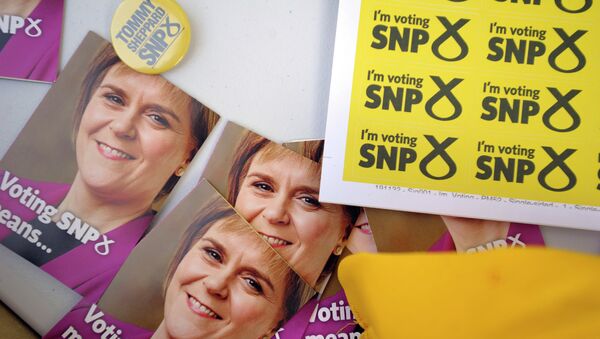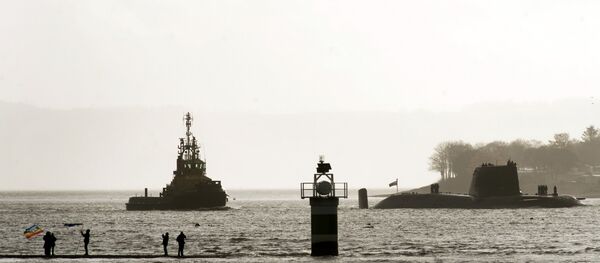"Clearly, it does look as if the SNP will have this pivotal role after the elections," Stewart Hosie, who served as Member of Parliament for Dundee East and is now standing for reelection, told Sputnik.
Hosie explained that for the last seven months opinion polls had given the SNP a substantial lead in Scotland. Today its popularity is almost at 50 percent, while support for Labour, which is traditionally strong in Scotland, is half this.
Ironically, the main parties, unable to form a majority government, will have to cooperate with the party that seeks Scottish independence and is opposed to some crucial tenets of both Labour and Conservative policy, such as austerity measures and the renewal of the Scotland-based Trident nuclear submarine program.
In the absence of a clear winner entering into the final week of the campaign, a hung or minority parliament is a likely outcome. If there is no formal coalition, factions in the parliament will need to have a so-called confidence and supply agreement or cooperate on a vote-by-vote basis.
The SNP's strong opposition to austerity measures has made it so popular, Hosie said.
"It lifts the squeeze of the ordinary people, and that is clearly very popular," Hosie told Sputnik.
The issue of Scottish independence should not be raised in the current campaign ahead of the UK general elections, Deputy Leader of the Scottish National Party said.
"This election is not about independence. It is up to the people, whether the people in future say we want a new referendum."
Financial independence is one of the main objectives in the SNP preelection manifesto.
"Fiscal autonomy is very realistic. Scotland is one of the wealthiest countries in the world potentially," Hosie told Sputnik.
"The sooner we have the power, the quicker we can work to get greater [fiscal] autonomy to create more jobs," Hosie said, explaining that it should happen as a transfer of powers from London to Scotland.
The SNP claims that the taxes raised in Scotland should stay in Scotland, instead of being sent to Westminster first. Moreover, revenues from the North Sea oil and industry make financial autonomy desirable for the country.
It should be possible to find a majority in the UK parliament to remove the country's nuclear deterrent from Scottish waters, given the firm position of Stewart Hosie told Sputnik.
"It might be the case that given that 75 percent of Labour candidates favour our view, we might find ourselves in a position where there is actually a majority to remove Trident. Historically, many Labour people are opposed to Trident."
Britain currently operates four Trident nuclear submarines out of the Faslane area of Scotland, the only facility in the United Kingdom that is able to accommodate the country's nuclear deterrent.
Cooperation with other parties on a vote-by-vote basis is preferable for the SNP, as it would mean they could keep their stance unchanged on such "red line" issues as Trident renewal, he said.
A so-called confidence and supply agreement, instead, would mean that parties would have to compromise their positions. Under a confidence and supply agreement, which is less strict than a formal coalition, smaller parties in Westminster agree to support the larger party on its budget proposals and other policies.
"There will be a substantial block opposed to the replacement of Trident. We simply do not have a hundred billion pounds to spend on this," Hosie concluded.
The SNP proposes spending the money needed for building new nuclear submarines on health, education and childcare.
Both SNP Leader Nicola Sturgeon and Deputy Leader Stewart Hosie have repeatedly stated that Trident is a "red line" issue which can nullify any chances of cooperation with Labour unless the latter withdraws its support from the renewal of the nuclear deterrent.
The general election in the United Kingdom will be held on May 7.





